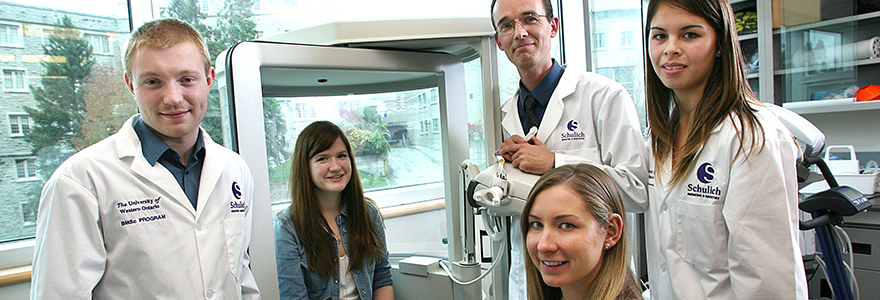Undergraduate
Related Links
- Bachelor of Medical Sciences (BMSc)
- Academic Calendar
- OWL (formerly WebCT)
- Registrar’s Office (Fees & Tuition)
- Fall/Winter Undergraduate Timetable
Contact
e. askMBP@schulich.uwo.ca
t. 519.661.2111 x.88030
Undergraduate

Thinking About A Degree in Medical Biophysics?
Medical Biophysics is an interdisciplinary field, using the principles and laws of the physics sciences to describe and investigate biological processes for the purpose of medical application. This field involves collaboration between physics, biology, and the basic medical sciences, which is essential to learn about diseases and their processes, and how to effectively diagnose and treat them.
Areas of Study
Our teaching and research focus is on the biophysics of the human body and of higher animals. Biological function is explored from the point of view of biochemistry and energy transformation, medical imaging, medical radiation physics and biology, oncology, biomechanics, biological systems control and environmental physics. The study of Medical Biophysics includes cardiovascular biophysics, bone and artificial joint biomechanics and cancer biology and radiation biophysics, which tackle the understanding and treatment of heart and blood circulation diseases, skeletal and joint diseases and cancer process and treatment.
Medical imaging is a major strength for the department, with a number of world-renowned scientists in the field. This field investigates the science and practical issues of medical imaging techniques such as ultrasound, CT (Computed Tomography) and MRI (Magnetic Resonance Imaging).
Areas of study within Medical Biophysics include:
- Conceptual understanding of a wide range of biophysical approaches to research;
- Basic mathematical tools for a quantitative analysis through “hands-on” laboratory work in a research environment;
- Theoretical, experimental and applied sciences courses to help students develop the required background for Medical Biophysics.








